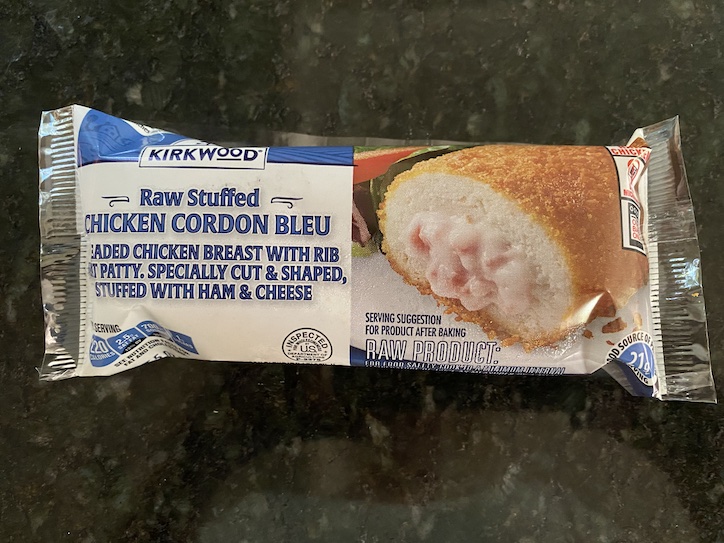Instead of relying on consumers to handle chicken Kiev like hazmat, maybe it’s time companies reduced the bacterial load, a study suggests.
Frozen, breaded, stuffed chicken entrees such as chicken Kiev and chicken cordon bleu have long been identified as the source of Salmonella outbreaks. Years ago, federal regulators thought improved product information and labeling, might thwart the problem. But it didn’t. The outbreaks just kept coming. Sometimes because consumers weren’t following cooking instructions, and sometimes because the products were so contaminated with Salmonella that just getting them out of the packaging transferred enough bacteria to kitchen countertops or consumers’ hands to make people sick.
Now, a study by CDC researchers provides new insight into the old idea that maybe companies should reduce the level of Salmonella on these products instead of putting all of the responsibility (and blame) on consumers. The reason? Not everyone has access to an oven, the only appliance that can safely cook these products.

When asked to participate in a survey, 4,142 people responded. Overall, 83 percent said an oven was one of the cooking appliances they used to prepare these items. But that percentage dropped 69 percent among those with annual household incomes of less than $25,000.
Overall, 54 percent said they used appliances other than an oven to cook these products. Thirty percent used air fryers, 29 percent used microwaves, and 14 percent used toaster ovens. The problem with all of these methods is that they don’t heat the food evenly and therefore cannot be relied upon to eliminate harmful bacteria.
Microwave usage was highest among men (34 percent) and people with household incomes under $25,000 (37 percent). “Respondents with lower incomes and who live in mobile types of homes reported lower oven use and higher microwave use. Persons within these groups might be at increased risk for illness related to both challenges in preparing these foods and access to appliances,” researchers said.
Breaded Chicken Salmonella Outbreaks
Since 1998, frozen, breaded, stuffed chicken entrees have been linked to 14 Salmonella outbreaks that included 200 illnesses, according to USDA FSIS. The most recent one occurred last year.
A Salmonella outbreak linked to breaded, stuffed chicken made by Serenade Foods of Milford, IN, and sold under the brand names Milford Valley, Dutch Farms, and Kirkwood sickened 36 people in 11 states, according to the Centers for Disease Control and Prevention (CDC). Twelve people were hospitalized.
The frozen, chicken Cordon Bleu and chicken broccoli and cheese products were sold at ALDI and other stores including Al’s, County Market, Martin’s Meijer, Save A Lot, Strack & Van Til, and Walmart stores.
The outbreak wasn’t the company’s first. In 2006, Kirkwood stuffed, breaded chicken products, made by Serenade Foods were linked to a Salmonella outbreak that sickened 29 people. Products made by Aspen Foods of Chicago were also linked to that outbreak.

After a number of outbreaks in the late 1990s and early 2000s, USDA FSIS worked with manufacturers to improve product information and labeling that would make it clear that these are not pre-cooked. The agency issued an official industry guidance in 2007. It stated that packaging should not have microwave cooking instructions but should include language such as “raw” or “uncooked” to make it clear that these products may be pre-browned, but they are not pre-cooked.
However, it quickly became clear that improved labels weren’t the answer.
Health officials in Minnesota, where four of these outbreaks took place between 1998 and 2006, published a 2008 study in the Journal of Food Protection noting that “modification of labels, verification of cooking instructions by the manufacturer, and notifications to alert the public that these products contain raw poultry, implemented because of the first two outbreaks, did not prevent the other outbreaks.”
Still, the approach didn’t change. For 15 years, the industry kept the focus on better labels and outbreaks kept occurring.
Then, in August 2022, USDA FSIS announced it would be declaring Salmonella an adulterant in breaded and stuffed, raw chicken products. This action would make it illegal for companies to sell these products if they are contaminated with Salmonella. Food safety advocates cheered the measure and polls showed overwhelming consumer support. (Not surprisingly, the chicken industry is not supportive of the idea.)
“By declaring Salmonella an adulterant in these products, FSIS will be able to ensure that highly contaminated products that could make people sick are not sold to consumers,” the agency stated in the announcement.
In their conclusion about the new study, CDC researchers blostered that idea saying, “Given the substantial percentage of respondents who reported using an appliance other than an oven, and socioeconomic characteristics of respondents with lower oven usage, companies could consider implementing additional interventions that rely less on labeling and consumer preparation practices and instead control or reduce levels of Salmonella in these products, such as selling them fully cooked, or monitoring and testing Salmonella levels, to ensure safety.”
Contact the Pritzker Hageman Food Safety Lawyers Today
Phone: 1-888-377-8900 | Text: 612-261-0856
The consultation is free and you never pay anything until we win for you.